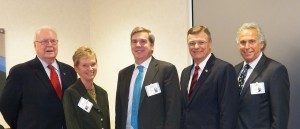Funding Will Help Align Classroom Instruction with Manufacturing Industry Needs
MILFORD – Thursday, December 18, 2014 – Building on the Patrick Administration’s historic commitment to strengthening the advanced manufacturing industry in Massachusetts, Housing and Economic Development Secretary Greg Bialecki announced a $747,160 grant to the Massachusetts Advancement Center Workforce Innovation Collaborative (MACWIC) program. This grant will enable MACWIC to expand testing of manufacturing students and capacity-building among the state’s vocational schools and community colleges, better aligning instruction with industry needs.

“I am proud of the great work MACWIC has accomplished in aligning classroom instruction with industry needs to better prepare students for careers in manufacturing,” said Secretary Bialecki. “Expanding their work to reach all corners of the Commonwealth will train the talent needed in the industry and strengthen our economy for years to come.”
MACWIC was established in February 2012 to preserve manufacturing knowledge and to execute the transfer of knowledge and critical skills to the current and future workforce through the development of strong manufacturing curriculum. MACWIC works in partnership with workforce training providers, vocational technical high schools, community colleges and universities. The Massachusetts Manufacturing Extension Partnership (MassMEP) is a founding member of MACWIC, along with the Manufacturing Advancement Center and Associated Industries of Massachusetts.

“The MACWIC is very pleased to have partnered with the EOHED and MassDevelopment on this grant,” said Thomas Wesley of Waters Corporation and MACWIC Steering Committee Chair. “Establishing a standard evaluation process and validation credential helps employers understand the skill set of an applicant and provides a tremendous opportunity for individuals considering careers in manufacturing.”
Massachusetts is home to over 7,000 manufacturers with 250,000 employees. The Patrick Administration is committed to supporting the growth of advanced manufacturing in Massachusetts, an industry that is expected to require 100,000 jobs in the next decade and offers careers in a sector with an average annual salary of $75,000.
The grant is funded through the Advanced Manufacturing Futures Program at MassDevelopment, which was created in August 2012 to raise the profile of advanced manufacturing by encouraging young people to enter the sector and facilitate the adoption of local innovation into small and mid-sized companies.
“MassDevelopment supports MACWIC because it excellently addresses the paradox at the heart of manufacturing in Massachusetts, namely, plenty of good jobs exist but not enough well-trained people can fill these slots,” said Marty Jones, President and CEO of MassDevelopment. “MACWIC meets this challenge head-on by educating students, training teachers, and assuring employers that MACWIC-certified job candidates have real-life skills that will translate well to the workplace.”
“MACWIC’s mission to preserve and share manufacturing knowledge with the future workforce of the Commonwealth is vital to support this important and resurgent industry. This nationally-recognized, innovative program is key to supporting the continued growth of manufacturing in Massachusetts,” said Representative John V. Fernandes (D-Milford), Founder and Co-Chair of the Joint Bi-Partisan Legislative Manufacturing Caucus and member of the AMC Executive Board.
In 2011, Governor Patrick launched the Advanced Manufacturing Collaborative (AMC), a partnership between industry and government to help build a globally competitive manufacturing industry in Massachusetts. Its five-point agenda brings together manufacturers, educators, academia and other organizations to work on industry-identified priorities including promoting manufacturing; workforce and education; manufacturing innovation; the cost of doing business including energy management and sustainability and access to capital resources.
In June 2013, Governor Patrick announced the creation of the Advanced Manufacturing Regional Partnership Academy, a first-in-the-Nation program designed to meet the manufacturing industry’s future workforce needs. The Academy provides hands-on learning opportunities and peer-education to regional leaders, helping eliminate one of the industry’s chief concerns of finding well-trained employees to fill available jobs in manufacturing.
To learn more about the Administration’s Advanced Manufacturing Collaborative and the work it is doing to support the industry, click here.




